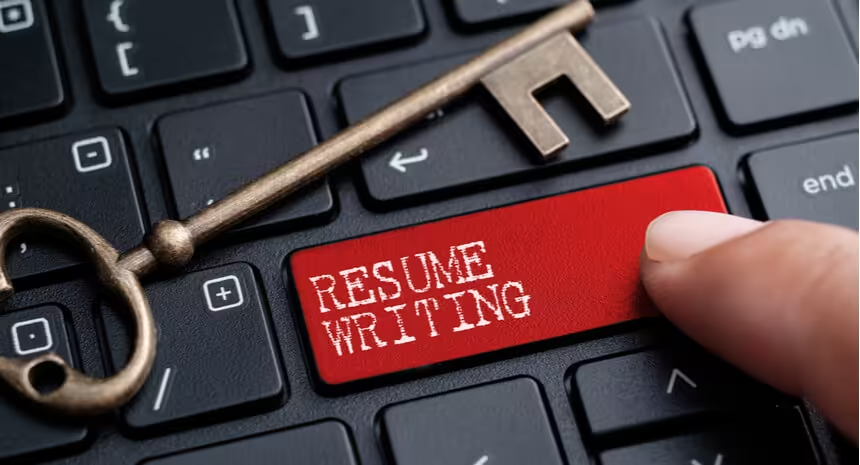As a government professional, whether you’re in policy-making, administration or public relations, you play a pivotal role in ensuring the efficient functioning of our institutions.
Given the importance and stature of government roles, it’s no surprise that the competition for these positions can be as fierce as the debates in a legislative assembly.
That’s why, to gain a competitive edge, it is essential to create a truly impressive resume.
This guide will will help you create an effective resume by showing you:
- Top government resume examples in various sectors.
- Step-by-step advice for writing a resume.
- Resumes tailored to different levels of your government career.
- The significance of cover letters in amplifying your qualifications.
- Key insights to bolster your job application.
Want to quickly create your government resume? Visit our AI Resume Builder. Upload your resume or start a new one, choose a template and fill it out quickly with the job-specific content suggestions it provides for every section of your resume.
Popular Government Resumes
Here’s an example made using our Resume Builder that exemplifies the professionalism expected by government hiring managers.
Are you looking for a specific job title? Check out our library of resume examples or find a specific job below:
Browse other popular samples
Related Guides & Tips
How to Write a Government Resume
Government positions often demand a more meticulous application process than the private sector. It’s not uncommon for these job applications to call for extensive details, diving deeper into your past job roles, specific accomplishments and sometimes even salary history.
Whether you’re trying to ascend the government ranks or venturing into a new public service role, the cornerstone of your search is understanding how to write a resume tailored for government positions.
The goal? Crafting a resume that meets stringent guidelines and captures your commitment to the public good.
One important note before we get started: Are you aiming for a specialized role within the government, like a research analyst or policy advisor?
If so, you might consider learning how to write a CV. CVs are more comprehensive documents detailing an individual’s full academic and professional background, encompassing research endeavors, policy contributions and related experience.
Browse our CV templates for suitable designs and check out our CV examples. Once you’re ready, assemble your CV with our CV Maker.
OK, back to resumes — let’s begin with a fundamental step: constructing a resume outline.
Here’s a checklist of what you’ll typically need, at a minimum:
- Your contact details displayed at the top or side of your resume.
- A compelling, keyword-optimized resume profile that captures immediate attention.
- A tailored section capturing the key skills that government roles demand.
- A comprehensive overview of your public service journey, beginning with your most recent job.
- An education section detailing degrees, certifications and training relevant to public service positions.
- Additional sections that underscore your commitment, achievements and service to the community and good governance.
Ready to make a great resume? Let’s learn how to build a government resume.
Step 1
Read the submission guidelines closely
Before you start writing, landing a government job requires understanding distinct application protocols. Your resume isn’t merely a testament to your achievements — it’s also a reflection of your ability to adhere to structured guidelines and standards.
Key considerations when tailoring your resume for government positions:
- Specific instructions: Always review the job posting closely. Each role might have unique application requirements.
- Structured format: Keep your resume organized, opting for a recommended layout like chronological, as specified.
- Comprehensive details: Government applications might require additional personal information, such as veteran status or security clearance details.
- Keyword incorporation: Integrate relevant keywords from the job ad to clearly show how you match the requirements of the role.
Keywords really improve your resume’s effectiveness. By targeting your resume to each role, you improve its chances of matching their specific requirements and scoring well with the applicant tracking system (ATS) they might use.
Also, following instructions is a nonnegotiable in the government sector. That’s why taking the time to make a resume that follows the job posting’s strict guidelines is key, as it illustrates your fit for a role in public service.
So, ensure each section of your resume, from skills to experiences, aligns with the specific demands of the governmental department you’re applying to.
Step 2
Add your contact info
Your resume serves as your passport to a position within the public sector. Make it easy for department heads and hiring panels to readily extend an invitation for further discussions or interviews by clearly presenting your contact information.
Include your:
- Full name.
- Phone number.
- Email address.
- City and state.
For government jobs, getting your resume details right is especially important. In addition to the contact info, your resume’s header should be straightforward and free of excessive design features.
Step 3
Summarize your public service experience
Your resume’s introduction is a summary of what you’d bring to the role. Strategically positioned at the top of your resume, this short paragraph offers a glimpse into your commitment, values and what you can bring to the governmental department.
Depending on the length and breadth of your tenure in the government, you have a few profile options:
- For those with extensive government experience, a professional summary is the way to go. This is a four- to five-sentence paragraph that highlights your main skills and notable achievements.
- If you’re looking for your first job or transitioning from the private sector, a resume objective may be more fitting. This approach communicates what you aspire to contribute to the role with the skills you already have.
Looking for a strategic advantage? Use keywords to customize your summary to align with the department or agency’s goals and values, which can often be found on official government websites. This increases your chances of getting noticed and helping your resume pass the ATS.
If you’ve served in the military, don’t forget to feature this on your resume prominently. Many government positions prioritize veterans, providing them with preference during hiring, so ensure it’s easily identifiable in your application.
Professional summary for government resume example:
Dedicated public servant with over five years of experience navigating diverse governmental departments, from local municipal offices to state-level agencies. Skilled in executing projects that serve public interests, managing interdisciplinary teams and implementing policies. Proficient in maintaining transparent communication, ensuring adherence to governmental standards and fostering partnerships with community stakeholders.
Sample objective statement for government resume:
As a recent graduate with a degree in public administration, I am excited to translate my academic insights into meaningful governmental contributions. With a commitment to public welfare and efficient administration, I aim to utilize my knowledge in policy formulation and public outreach. I am passionate about joining a mission-driven team, championing the values of transparency and integrity in the realm of public service.
Step 4
Highlight your KSAs
Public service and government roles heavily weigh KSAs – Knowledge, Skills and Abilities. It’s not just about listing past roles but demonstrating how your KSAs align with the job requirements.
Your hard skills, such as managing public funds or understanding regulations, and your soft skills, like effective communication with constituents, come together to paint a complete picture of your capability.
Don’t overlook your technical skills. While rarely on the cutting edge, the skills needed to perform many government jobs have become more modernized. Skills like mastery of public administration software and community engagement tools are essential for many roles.
Hard and soft skills for a government resume
- Public fund management
- Community outreach coordination
- Regulatory compliance
- Policy formulation
- Effective communication
- Decision-making
- Public relations
- Integrity and accountability
Step 5
Share more detail about your work history
If you’ve been in government service for a long time, your career history will show your expertise in public policy, community outreach and efficient administration. If you’re transitioning into a government role, you can hone in on transferable skills, like effective communication and stakeholder management, that make you an appealing candidate.
In both situations, your objective is to ensure your work experience on your resume is presented with distinction.
Consider the following strategies to make an impactful job history:
- Highlight achievements, not just duties: Emphasize measurable outcomes like streamlined processes, successful program implementations or cost savings rather than only listing your tasks.
- Showcase career evolution: Describe your roles in reverse-chronological order, starting with the most recent position, to emphasize your development and ascent within the government.
- Employ action words: Enrich your resume with terms like “orchestrated,” “implemented” and “enhanced” to give some energy to your career story.
Citations, awards and community feedback will help you stand out. If you’ve received commendations or accolades for your work, ensure you include them on your resume. Such acknowledgments back up your claims of dedication and excellence.
Public service experience example:
Community Outreach Coordinator, State Governance Office
Portland, OR
April 2019 – Present
- Work alongside teams to strategize on community engagement initiatives, resulting in a 25% uptick in community participation and achieving a 98% positive feedback rate.
- Play a crucial role in streamlining communication processes, leading to a 15% improvement in efficiency and higher accolades from community representatives.
- Formulate and promote a civic education campaign, resulting in a 50% increase in community awareness of local government programs.
Step 6
Highlight your education credentials
Some roles have strict educational requirements, while others view your degree as an optional but significant asset that can make you a more valuable or appealing candidate.
The education section allows you to highlight your acquired knowledge, telling potential employers you’re well-prepared to excel in a government role.
You should also create a distinct section for specialized training and certifications. In the governmental realm, supplementary qualifications, like certifications in project management or public service delivery, can provide a competitive edge.
Government education entry example:
Education
Bachelor’s of Science in Public Administration,
Civic University, Washington, D.C. | 2024
Certifications
Certified Public Management Professional,
National Association of Government Professionals
Issue Date: July 2024
Step 7
Add optional sections for an additional boost
Go beyond work experience, education and primary qualifications for your government resume. Have you received awards for outstanding public service? Or perhaps you’ve volunteered in community initiatives or programs highlighting your commitment to public welfare.
Here are some sections you might consider:
- Volunteer work: Emphasize experiences like community outreach programs or participation in government-related events. This showcases your dedication to public service and the community.
- Foreign languages: The public sector often involves interactions with diverse populations. Knowing multiple languages can enhance your ability to connect with various community groups and can be an asset in diplomatic roles.
- Publications and research: Have you contributed to policy papers, research articles or whitepapers relevant to the public sector? Citing these works can showcase your expertise and dedication to advancing government practices.
If you’ve undertaken additional courses or attended workshops related to public administration, policy analysis or community engagement, consider listing them under a ‘Continuous Professional Development’ or ‘Additional Training’ section. This illustrates your dedication to advancing in the governmental sector.
As you embark on your quest to find a government job, remember to choose an appropriate government resume template.
Government institutions are notoriously conservative in what they expect of employees, with individual flair being less valued than in some industries’ private sector.
That’s why we recommend a simple resume design for most government applications. These templates exude professionalism and align with the formal nature of governmental positions.
While there are various templates available, including more creative designs, it’s recommended for government officials to prioritize simplicity. Choose a design that reflects your professionalism and complements the standards expected in public service.
Don’t invest too much time merely searching for a template! We offer an extensive collection of free templates for Microsoft Word and Google Docs.
Your primary goal is to make a well-structured resume that captures your public service journey. Remember, there isn’t a single perfect choice. Select what genuinely represents you and matches your ambitions for your career.
resumes made with Resume Now!
Government Resume Examples
As your public service career progresses, your resume’s structure should reflect that evolution. Consider which of these three main resume formats is best for your current career stage:
- Government newcomers might benefit most from the functional resume format.
- Government professionals with several years of service should consider a combination resume format.
- Experienced hands in government might lean toward the chronological resume format.
Explore the following visual examples for each format.
Entry-level government position example
What makes this an excellent entry-level government position resume?
-
Clear career objective
A resume objective is crucial for those new to public service. It should convey how specific skills can benefit the department or agency, especially when lacking direct experience.
-
Distinct skills sections
Differentiated skill sections present the breadth of your capabilities. Bullet points enhance visual appeal and ease of reading.
-
Designed for minimal work history
Highlighting skills and knowledge over limited job history, this candidate adeptly showcases their potential as a valuable asset to a government department.
Midcareer government position example
Why does this midcareer government resume stand out?
-
Compelling professional summary
The professional summary highlightings significant achievements. This candidate emphasizes their experience and skills in “policy development” and “community outreach.”
-
Detailed skills section
Once established in government roles, displaying niche skills becomes vital. This candidate does so effectively, positioning their skills section before their job history.
-
Illustrated career progression
Listing roles in reverse-chronological order provides a transparent view of career growth, a trait that governmental agencies deeply value.
Expert government position example
What distinguishes this expert government position resume?
-
Emphasis on professional trajectory
For experienced government employees, the focus should be on a rich career history. This resume, in reverse-chronological order, underscores accomplishments in each role.
-
ATS-friendly design
Many government agencies use applicant tracking systems (ATS) to filter resumes. Chronological formats with minimal design elements often sync better with ATS due to their clear emphasis on roles and dates.
-
Consistent format illustrates growth
The chronological structure portrays consistent growth in public service, appealing to departments seeking seasoned leaders.
Add a Cover Letter
In public service, a well-crafted cover letter can be your ticket to the government role you’re after.
A cover letter allows you to dig deeper into experiences not detailed in your resume. It also offers an opportunity to highlight your genuine interest in serving the public and your alignment with the specific requirements of the government position.
For step-by-step guidance, check out our guide on how to write a cover letter and read a few cover letter examples. When you’re ready to make your letter, consider using our Cover Letter Generator, which generates text suggestions you can edit to reflect your unique voice and commitment to public service.
Key Takeaways
-
Highlight government experience
Your government roles and experience form the bedrock of your resume. Detail past positions, specific departments or agencies you’ve worked with, and your key responsibilities in those roles.
-
Follow the application guidelines
Government job applications often have specific formatting and content guidelines. Ensure your resume meets these requirements to demonstrate your attention to detail and respect for protocol.
-
Emphasize achievements and KSAs
Knowledge, Skills and Abilities (KSAs) are central to many government positions. Highlight your achievements in past roles that align with these KSAs. For example, if you’ve implemented a policy that yielded positive results, make sure it’s prominently showcased.
-
Weave in relevant training and certifications
Include any training programs, workshops or certifications relevant to public service, such as public administration courses, leadership training and certifications in regulatory compliance.
-
Showcase a broad skill set
From project management in public works to fostering interdepartmental collaborations, your soft and hard skills position you as a valuable contributor in the public sector.
-
Thoroughly review your application
Government roles emphasize precision and accuracy. Ensure your resume is error-free, and consider seeking feedback from a colleague or mentor familiar with government job applications.
-
Pair with a tailored cover letter
A thoughtfully crafted cover letter can bolster your application. Use it to share a specific experience or project that underscores your dedication to public service and the particular role you’re applying for.
FAQ for Job Seekers
Last Updated: January 01, 2025
Was this information about Top Government Resume Examples & Writing Tips For 2025 helpful? Let us know!
Don is a Certified Professional Resume Writer (CPRW) with more than 10 years’ experience creating digital content, including four years helping job seekers develop their careers. He holds an M.S. in Journalism from Northwestern University.
More resources

How to Write a Resume: Guide & Examples for 2025
If you re wondering how to write a resume that grabs attenti...

Should You Put Your Address on Your Resume? (Guide + 5 Example Resume Headers)
Should you put your address on your resume? We ll answer you...

HR Assistant Resume: Examples, Templates and Tips for 2025
Need an HR assistant resume that gets interviews in 2024? Our ...

Medical Resume: Examples, Templates & Tips
Check out our resume examples for help getting your medical re...

Business Analyst Resume: Examples, Templates and Tips for 2025
Make a business analyst resume that gets interviews. Use our w...

